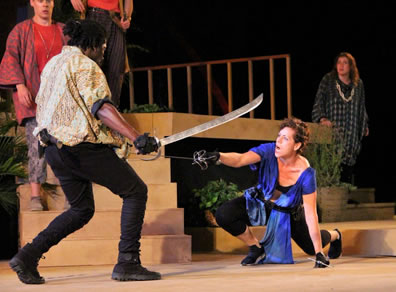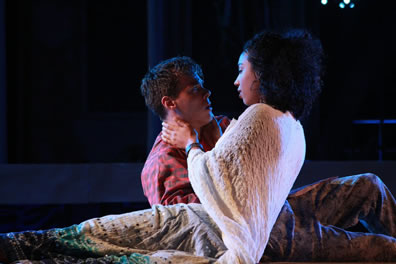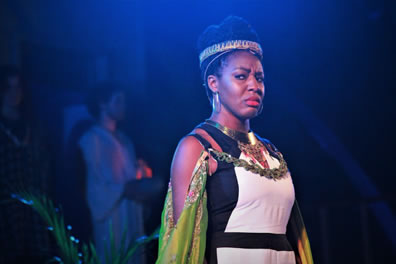Romeo and Juliet
Fight Time
Elm Shakespeare Company, Edgerton Park, New Haven, Connecticut
Thursday, August 31, 2017, lawn blanket, about 15 feet center-left of stage
Directed by Raphael Massie

Mercutio (James Udom, left) and Tybalt (Claire Warden) fight in Elm Shakespeare Company's production of William Shakespeare's Romeo and Juliet. Fight Director Ted Hewlett's choreographed combat is integral to the production's thematic exploration of violence's consequences. Photo by Mike Franzman, Elm Shakespeare Company.
Violence often is the easiest answer for those in confrontational situations and generally the most attractive option for those watching. Whether prompted by anger, honor, fear, revenge, pride, ideology, or, ironically, love, striking others (or oneself) with fists, blade, poison, or other weapons offers immediate satisfaction. That, however, blinds the perpetrators and enablers to longer-term consequences that incur a level of pain and difficulty far outweighing the initial gratification.
Lacking the ability to fully know those consequences before striking the blow, we are left with parables to give us glimpses. William Shakespeare gives us such a parable with Romeo and Juliet, and Raphael Massie, with his brashly hip production for the Elm Shakespeare Company in New Haven, Connecticut, expands the play's effectiveness from that mere glimpse to a visceral understanding of violence's full effects.
Not so ironically (re: "attractive option" above), the theatrical highlight of this production is the violence itself. Exquisitely choreographed by Fight Director Ted Hewlett and Assistant Fight Director Claire Warden (who plays Tybalt), the extended fight scenes make for thrilling theater as combatants use all manner of weaponry and wherewithal to hurt their specific or general foes (i.e., Capulets versus Montagues). Among the lawn-filled crowd at Edgerton Park's outdoor theater, gasps mingle with titters, shudders with tingles during the fights. The thing is, those of us who are mesmerized by the spectacle—even enjoying the brutal brawls—know where it's all heading.
Shakespeare himself opens the play with a spoiler alert. "From ancient grudge break to new mutiny, where civil blood makes civil hands unclean, from forth the fatal loins of these two foes a pair of star-crossed lovers take their life," says the Chorus speaking the prologue. Such prologues were common in Elizabethan theater, but this one for Romeo and Juliet is Shakespeare's only prologue that describes the coming play's plot. His play is not intended to be a twist-ending thriller but rather a thrilling look at the twisted nature of humanity. We see choices and turns of fate leading to an inevitable ending that we know needed not be so inevitable. Why did Sampson have to bite his thumb at Abraham in the first place? Ancient grudge.
Massie uses the Prologue and tweaks Shakespeare's staging to emphasize this thematic course. His Verona is a North African community, Elizabeth Bolster's set featuring a Mediterranean veranda with Moorish arches in pale wood, lattice windows, a market stall, ferns in planters, geraniums in window boxes, and paper globes hanging above. Romeo (Steven Lee Johnson) and Juliet (Courtney Jamison), wearing white funeral gowns, walk onto the stage to Stevie Wonder's "All in Love Is Fair" (sample lyric: "Love's a crazy game, two people vow to stay in love as one they say, but all is changed with time, the future no one can see, the road you leave behind, ahead lies mystery"). The rest of the cast follows, standing in groups (Montagues on one side, Capulets opposite, the Prince and her kinsmen together) as Friar Laurence (James Andreassi) speaks the prologue. Costumes by Herin Kaputkin befit a modern North African setting, but a few characters also are wearing funeral gowns. They are merely faces now (interesting faces—what must be Tybalt appears to be a woman) but they will become multidimensional people as we journey with them to their individual (and collective) tragic endings.
"Two such opposèd kings encamp them still in man as well as herbs, grace and rude will: and where the worser is predominant, full soon the canker death eats up that plant," Friar Laurence says, meditating on the herbs he's gathering. The characters in this production can't grasp how "rude will" becomes a canker until death devours them, with Romeo experiencing it over and over through to his own death. Believing Juliet dead, he swallows his poison with deliberate alacrity. "Thus with a kiss," he says, and kisses Juliet's lips. She awakes from her drugged, death-like state and, rejoicing that Romeo is there as promised, begins kissing him passionately in return. He looks at her in shock as he falls back and then with horror as he gasps out his final words, "I die." It is often said that people who take their own lives don't consider the impact their actions will have on loved ones. Johnson's Romeo realizes the consequences for himself—a life with Juliet unlived. To achieve this effect, Massie has to rearrange the text. Beyond altering Shakespeare's timeline, in which Romeo dies well before Juliet awakes, Massie cuts out Friar Laurence's presence in this scene until he appears before the Prince at the end.
Massie makes another thematically poignant staging decision contrary to Shakespeare's script in the pivotal Act III, Scene 1, when Tybalt kills Mercutio (James Udom), and Romeo, in turn, kills Tybalt. Faced with Tybalt's insistent challenge to fight, Johnson's Romeo instead kneels. "Till thou shalt know the reason of my love," Romeo says, "good Capulet—which name I tender as dearly as my own—be satisfied." Smart move. However, Mercutio intervenes: my impression is that he's reacting to what he sees as an episode of bullying (the schoolyard edict, "before you fight him, you have to fight me"). Though seriously fighting, Tybalt and Mercutio nevertheless appear to be enjoying their duel of swords, knives, and fists—until Mercutio receives the fatal knife thrust and gains immediate clarity: he's just been killed because Tybalt is carrying out an ancient grudge against Romeo for no reason other than he's a Montague. "A plague o'both the houses!" he yells, the first time in my experiences that this famous line rings so resonantly. Notably, he yells it at Tybalt, who also is stunned by what just happened. Mercutio never leaves the stage, as directed in the text but, instead, falls to the ground and shouts one last time, "Your houses!" as death closes in on him.
Tybalt doesn't leave the stage either. Warden remains motionless, gripped in the consequences of what she's done. When Benvolio (Avery Bargar), kneeling next to Mercutio, wails, "O Romeo, Romeo, brave Mercutio is dead!" Romeo sees Tybalt still standing there and challenges her. Of course, she must answer. Another supremely choreographed sword and knife fight ends up in an all-out punch-and-clawing brawl concluding with Romeo dashing Tybalt's head against a bench on the stage. Again, the perpetrator suffers the paralyzing effect of only now clearly seeing what consequences must come. "O, I am fortune's fool!" Romeo yells.
Leaving Mercutio on stage also heightens the role of Prince Escalus (Tamika Pettway) in this scene. Along with expanding Escalus's presence, Massie's staging emphasizes how she, too, is a victim of Verona's violence. In the opening scene's brawl, Mercutio and Paris (Martin K. Lewis) stand by her side as she orders that hostilities cease. The three also mingle together at Capulet's party, and now, she and Paris enter in the wake of another brawl, this time finding Mercutio dead. As Paris kneels next to his cousin's body, Pettway's Escalus shouts, "Where are the vile beginners of this fray?" with specific emphasis on the word vile. This scene is notable for Lady Capulet (Samantha Dena Smith) effusively grieving over Tybalt's murder, but here, Escalus becomes a poignant counterpoint. As Lady Capulet demands the law on Romeo's head for killing Tybalt, Pettway's Escalus thunders, "Romeo slew him, he slew Mercutio: who now the price of his dear blood doth owe?" Lord Montague (Andrew Borthwick-Leslie) points out that Romeo, by killing Tybalt, performed the tenets of the law concerning Mercutio's murder. Escalus immediately cuts him off (Shakespeare's verse structure dictates this): "And for that offence," Pettway says with instant disgust at Montague's legal quibbling, "immediately we do exile him hence." By emphasizing Escalus's kinships throughout the play, Massie gives the Prince contextual emotional heft at the end of the play, too, after Romeo kills Paris at Juliet's grave. "I, for winking at your discords, too have lost a brace of kinsmen. All are punished," Escalus says, not a legal edict but a commentary on the retribution a society suffers when enabling discord and violence.
Back at Act III, Scene 1, Mercutio and Tybalt remain on stage as everybody else leaves. Two street musicians, who have been providing segue soundtracks between scenes, emerge with the funeral gowns. Mercutio and Tybalt stand up, don the gowns, and exit expressionless. It reminds me of the cemetery residents in the final scene of Thornton Wilder's Our Town: the bodies are there, but the personalities are gone. Given the performances of Udom and Warden, it is a great loss.
Udom's Mercutio is the coolest dude in Verona, a gifted wit, incessantly charming, the literal life of the party. He expresses a carefree attitude, but there's something deeper in his countenance, a wary watchfulness of the city's warring factions. Though Benvolio (not Romeo) is his closest friend, he has no ill will against the Capulets and even shares mutual admiration with Tybalt: he genuinely praises her fencing skills in his "king of cats" speech and competitively dances with her at the Capulet party. Udom's delivery of Mercutio's Queen Mab speech mirrors Massie's thematic purposes. The speech starts in jesting fun as the dream fairy deals with matters of love and money; but Udom's tone turns with the line in which "sometime she driveth o'er a soldier's neck" and with increasingly frenetic anger he describes Queen Mab's dreams of war, nature's bent toward violence, and sexual assault. In his telling, "That very Mab" had transformed from mischievous fairy to an evil manifestation of the human psyche.
Warden builds her portrayal of Tybalt on one of the first lines she speaks when she tells Benvolio, "What, drawn, and talk of peace? I hate the word, as I hate hell, all Mongagues, and thee." As one who hates peace, she loves fighting. In the opening scene, the Capulet servant Gregory (another regendered role with Cassandra DeMarco as a woman who is an accomplished and more-than-willing fighter) escalates the brawl with Montague servants when she sees "one of my master's kinsmen," Tybalt, approaching. Warden's Tybalt, though, doesn't engage at first: she simply watches with appreciative glee as the men and women tangle until Benvolio enters and tries to part the fray. Then all hell breaks loose (which, remember, Tybalt says she hates but clearly loves here).


Raphael Massie, director of Elm Shakespeare Company's production of William Shakespeare's Romeo and Juliet, tweaked Shakespeare's staging to emphasize the consequences of violence for both perpetrators and the community at large. Top, Romeo (Steven Lee Johnson), having already swallowed poison, reacts in horror as Juliet (Courtney Jamison) awakes. Above, Prince Escalus (Tamika Pettway), in an expanded role, reacts to losing "a brace of kinsmen" to Verona's violence. Photos by Mike Franzman, Elm Shakespeare Company.
The Montague and Capulet servants maintain their presence throughout the play, and with a total cast of 24, including members of Elm Shakespeare's "Scholar" Intern Company, this Verona is a bustling town. Massie fills in scene changes with selections of modern music that start as a soundtrack over the speakers and merge into elements of stage business, played on boom boxes or sung by the street musicians (sound design by Michael Vincent Skinner). Segueing into the play's third scene, the Capulet servants dance to the music playing on a boom box as they prepare the house for hosting the big party, but when they see Lady Capulet approaching, they turn off the music and hurriedly scatter.
Smith plays Lady Capulet with emotionless rigidity. She orders Nurse (Gracy Brown in a casually hilarious turn) to fetch Juliet, but after sending Nurse away, Lady Capulet freezes trying to speak to Juliet and calls Nurse back. There is irony in her line "I was a mother to you at your age," in that she isn't cut out to be a mother at any age: she's all about her comfort and status. While she may genuinely grieve for Tybalt (or, at least the loss of the power and security Tybalt represented), her wailing over Juliet's supposedly dead body rings hollow to us who have watched her stunted relationship with her daughter. Not surprisingly, Juliet is very much her father's daughter. Capulet (Mark Sage Hamilton) shows a warmly loving attitude, except when Juliet rebels against his edict for her to marry Paris, which turns him violently angry as his passion turns inside out (throughout this scene, Smith's Lady Capulet stands by coldly observing).
Jamison plays Juliet as a teen who considers herself on the cusp of womanhood. Paris clearly bores her at the party, and she doesn't initially spark with Romeo, either. He's hitting on her with all his romantic charm, but she is too intellectual for that and responds to his sonnet-structured pickup line with a sonnet-structured riposte of her own that is far wittier than his. Johnson's Romeo loves it, appreciating her intellect as much as her beauty, and she begins appreciating his appreciation and his continuing laser focus on her. And so they kiss (by the book, she notes, having read that book, apparently).
For the balcony scene, Jamison's Juliet emerges in full-on agitation, at war with her sudden emotional condition. Her flailing her arms about as she paces back and forth prompts Romeo to say expectantly, "She speaks," and then, puzzled, "And says nothing." This establishes a comic tone for this famous scene, presented with more laugh-generating readings of the lovers' lines than I usually hear. At last Juliet lets go of fighting herself: "Ay me!" she says, followed by "O Romeo, Romeo, wherefore art thou Romeo?" In Jamison's delivery, this is a "whatever!" conclusion, that the problem here is his name, nothing else. Put that aside, and we're good. It has nothing to do with him, or his hand, "nor foot, nor arm, nor face, nor any other part belonging to a man," and she clearly means his penis and shudders at the potential there. This Juliet has a powerful case of the smittens. She runs screaming back into her room when Romeo reveals himself. "What man art thou that thus bescreened in night so stumblest on my counsel?" she asks. Romeo speaks his reply, "By a name I know not how to tell thee who I am," in dumbfounded frustration: um, you just said I should be any other name but Romeo, so how can I tell you who I am?
Johnson's Romeo is a hard characterization to categorize. He seems a wuss much of the time, a studied romantic more than a sincere one. At other times his intelligence resides in the same orbits as his emotions: heart and mind are one (the same could be said of Jamison's Juliet). These two kids live sheltered lives, and with such lives comes intellectual confidence but social naïvéte. Individually and paired, they embody lives of great potential that are, consequently, extinguished.
Eric Minton
September 20, 2017
Comment: e-mail [email protected]
Start a discussion in the Bardroom



 Find additional Shakespeareances
Find additional Shakespeareances